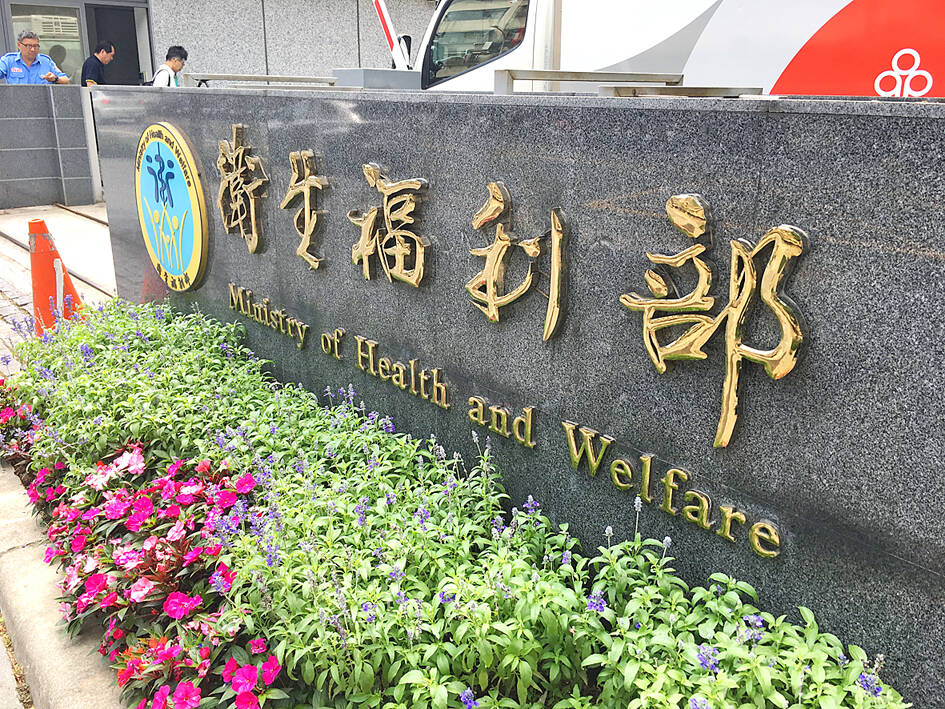The central government plans to subsidize the freezing of eggs for medical reasons, Health Promotion Administration (HPA) Director-General Wu Chao-chun (吳昭軍) said yesterday, adding that the policy might be implemented by the end of the year.
There were about 121,000 people diagnosed with cancer in 2021, with those aged 15 to 49 years old — the childbearing age — making up 16 percent, cancer registry data for that year showed.
Among the 15,448 breast cancer cases, 31.33 percent were of childbearing age, and 2,700 of the 4,800 cases who were of childbearing age, were aged between 20 and 44 years old, the data showed.

Photo: Lin Hui-chin, Taipei Times
Some female patients consider freezing their eggs before undergoing treatments for cancer, catastrophic illnesses or other diseases that might affect their fertility to preserve the possibility of motherhood in the future.
However, egg freezing treatments cost about NT$80,000 to NT$120,000 (US$2,595 and US$3,893), with a yearly storage cost of between NT$5,000 and NT$10,000, so patient support groups have been calling on the government to subsidize medical egg freezing.
The issue has been in discussion since last year and is becoming clearer, Wu said, adding that the HPA is consulting with experts to plan the details and draft healthcare facility guidelines.

Photo courtesy of the New Taipei City Government
Breast cancer patients would be eligible for the program, but the specific cancer types and treatments, as well as the total number of eligible patients and budget are still under discussion, he said.
Hopefully the policy can be implemented by the end of the year, or at least the beginning of next year, Wu added.
Egg freezing subsidies for cancer patients are being offered in Taipei, New Taipei City, Chiayi City and Taoyuan City, while social egg freezing subsidies are available at Taoyuan City, Hsinchu City, Yunlin County and Miaoli County, Wu said, adding that the subsidies range between NT$20,000 and NT$35,000.
Wu said no central government in the world subsidizes social egg freezing, as it might encourage people to get married and have a child at an older age.
Taiwan does not have established guidelines for discussing fertility preservation with cancer patients, Hope Foundation for Cancer Care deputy CEO Brenda Yen (嚴必文) said in response to the HPA’s plans.
Sometimes, doctors prioritize saving a patient’s life and do not mention the effect the treatment would have on the patient’s fertility, she said.
The subsidy is a good start, Yen said, adding that she hopes the communication between physicians and patients can also improve so they can plan for fertility preservation earlier.
Yen encouraged cancer patients to look up relevant information on their own, saying that the foundation’s official Web site has a fertility inquiry form that patients can use.
Taiwan Breast Cancer Alliance secretary general Wu Shu-chiung (伍淑瓊) said there are advanced and effective treatments for breast cancer, so patients still have a long life ahead after receiving treatment.
Cancer patients sometimes cannot think about their future when they are diagnosed with cancer, so hopefully physicians can proactively inform them about fertility preservation and help them think about their opportunities, Wu Shu-chiung said.
Support groups should also remind patients to plan in advance, he added.

WANG RELEASED: A police investigation showed that an organized crime group allegedly taught their clients how to pretend to be sick during medical exams Actor Darren Wang (王大陸) and 11 others were released on bail yesterday, after being questioned for allegedly dodging compulsory military service or forging documents to help others avoid serving. Wang, 33, was catapulted into stardom for his role in the coming-of-age film Our Times (我的少女時代). Lately, he has been focusing on developing his entertainment career in China. The New Taipei District Prosecutors’ Office last month began investigating an organized crime group that is allegedly helping men dodge compulsory military service using falsified documents. Police in New Taipei City Yonghe Precinct at the end of last month arrested the main suspect,

A cat named Mikan (蜜柑) has brought in revenue of more than NT$10 million (US$305,390) for the Kaohsiung MRT last year. Mikan, born on April 4, 2020, was a stray cat before being adopted by personnel of Kaohsiung MRT’s Ciaotou Sugar Refinery Station. Mikan was named after a Japanese term for mandarin orange due to his color and because he looks like an orange when curled up. He was named “station master” of Ciaotou Sugar Refinery Station in September 2020, and has since become famous. With Kaohsiung MRT’s branding, along with the release of a set of cultural and creative products, station master Mikan

RISING TOURISM: A survey showed that tourist visits increased by 35 percent last year, while newly created attractions contributed almost half of the growth Changhua County’s Lukang Old Street (鹿港老街) and its surrounding historical area clinched first place among Taiwan’s most successful tourist attractions last year, while no location in eastern Taiwan achieved a spot in the top 20 list, the Tourism Administration said. The listing was created by the Tourism Administration’s Forward-looking Tourism Policy Research office. Last year, the Lukang Old Street and its surrounding area had 17.3 million visitors, more than the 16 million visitors for the Wenhua Road Night Market (文化路夜市) in Chiayi City and 14.5 million visitors at Tainan’s Anping (安平) historical area, it said. The Taipei 101 skyscraper and its environs —

LITTORAL REGIMENTS: The US Marine Corps is transitioning to an ‘island hopping’ strategy to counterattack Beijing’s area denial strategy The US Marine Corps (USMC) has introduced new anti-drone systems to bolster air defense in the Pacific island chain amid growing Chinese military influence in the region, The Telegraph reported on Sunday. The new Marine Air Defense Integrated System (MADIS) Mk 1 is being developed to counter “the growing menace of unmanned aerial systems,” it cited the Marine Corps as saying. China has constructed a powerful defense mechanism in the Pacific Ocean west of the first island chain by deploying weapons such as rockets, submarines and anti-ship missiles — which is part of its anti-access/area denial (A2/AD) strategy against adversaries — the